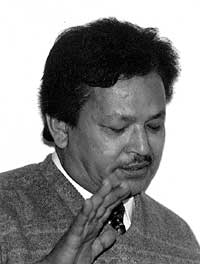 Few poets today write as well as the Nepal-bhasa poet Purna Bahadur Vaidya about how we are interconnected with our surroundings. The external and the internal meld together in his sensibility, as he offers up the elements, space and nature as objective correlatives to deeply personal experiences. Water is Water, his book of poems examining water as an extended metaphor, has been translated into English by the American poet Wayne Amtzis, and is awaiting publication.
Few poets today write as well as the Nepal-bhasa poet Purna Bahadur Vaidya about how we are interconnected with our surroundings. The external and the internal meld together in his sensibility, as he offers up the elements, space and nature as objective correlatives to deeply personal experiences. Water is Water, his book of poems examining water as an extended metaphor, has been translated into English by the American poet Wayne Amtzis, and is awaiting publication. The poems below are twice-translated: they were originally written in Nepal-bhasa, and translated into Nepali in the book Newari Bhasaka Kehi Adhunik Kabita (Royal Nepal Academy, 2049). From those renderings they appear here in English. It is impossible to tell how close they are to the original.
The first poem visits a theme that Vaidya often writes on, the search for personal freedom:
The moment I see a pair of feet
The moment I see a pair of feet
I start to murmur-
My destination remains
Many places I must reach
The moment I see doors and windows-
I startle-
I must liberate myself
I must step out of myself
Discoveries lie all over somebody's path
The struts of rooms and houses are of no use
The path is itself the way of gathering
How would we know the other if there were no
path?
I inside
and outdoors, the world
I feel a dissatisfaction
until I leave these restless dimensions
a desire to see the countenances of my face
The outdoors feel a similar urgency to obtain me
My form is daubed outdoors
My life is lost somewhere outdoors
Experiences have spilled all over the path
What is the home but a rehearsal room?
Only beyond the threshhold does the path begin
My expression is outdoors
and the expression of the outdoors is in me
Should I not go?
My path could lag behind
A screw in the machine could drop out
A light may not light up in the lamppost
How could one say that
something unwanted might not happen
on the selfish, hastening path?
The moment I see a pair of feet
I start to murmur-
My destination remains
Many places I must reach
The moment I see doors and windows-
I startle-
I must liberate myself
I must step out of myself
The second poem focuses on the fear of old age and death, a theme as universal as any:
When the breeze blows in the evening...
When a breeze starts up in the evening
the entire pond starts to shiver
Its cheeks, firm in the morning
wrinkle at the evening breeze
When the breeze starts up
the pond gathers into itself
and holds tight onto its banks
The evening breeze reaches it
as soon as the day passes-
And who can stop it?
Terrorised by this relentless truth
a hundred times a day
the water extends the waves
along its wrinkled surface
and hunches them into itself
The sky-mirror watches on
In the end
it has no choice but to accept
the most solid evidence to prove its doubts
A soldier defeated and wounded
in the mandatory battle with time
The body that was moist in the morning
has folded a little
has dried a little
now
Within is the fear of the terrible
Its restiveness may suddenly
disappear as it watches on
The waves of youthfulness
arise as stifled sighs
and arise again and again
Only emptiness arises
In that too it used to harbour a dream
to flow from there, gurgling, somewhere
else
That dream too hides along with the sighs
and is thoroughly finished


